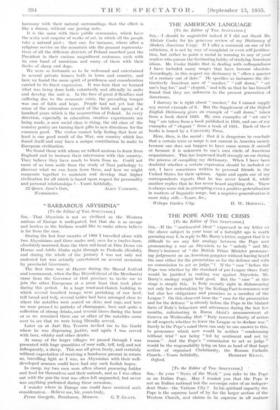THE AMERICAN LANGUAGE [To the Editor of THE SPECTATOR.] SIR,—I
should be ungrateful indeed if I did not thank Mr. Alistair Cooke for his generous review of my Dictionary of Modern' American Usage. If I offer a comment on one of his Criticisms, it is not by way of complaint Or even self-justilica- tiOn, but rather to point a moral in warning to any of your readers who pursue the fascinating hobby of studying American idiom. Mr. Cooke thinks that in dealing with colloquialisms I have included many usages that have become obsolete. Accordingly, in this respect my dictionary is" often a quarter Of a century out of date." He specifies as instances the dis- tinctively American • uses of " masher," " call down," " set one's bag for," and " elegant," and tells us that he has himself found that they arc unknown to the present generation of Americans.
I daresay he is right about " masher," for I cannot supply any recent example of it.' But the Supplement of the OxfOrd English Dictionary gives an example of " call down," taken from a book dated 1923. My own examples of " set one's bag " are taken from a book published in 1930, and one of my examples of " elegant " from a book of 1931. Each of these books is issued by a University Press.
Here, then; is the moral : that it is dangerous to conclude that a certain term or Usage is not current in America merely because one does not happen to have come across it oneself or because it is unknown to one's own circle of American acquaintance. This has impressed itself strongly on me during the process of compiling my dictionary. • When I have been doubtful whether a certain expression should be included or not, I have sometimes written to personal friends in the United States for their opinion. Again and again one of my correspondents reports that he has never heard it, while another replies that he has never heard anything else. There is always some risk in attempting even a positive generalisation in matters of linguistic usage, but a• negative generalisation is more risky still.—Yours, &c.,






































 Previous page
Previous page